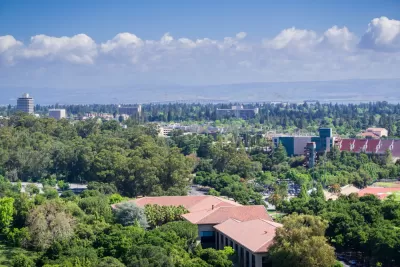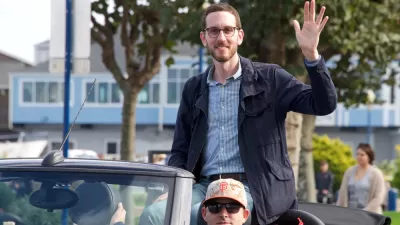The proposed legislation would open up cities like Palo Alto to higher-density housing.

Liam Dillon reports on Senate Bill 50, the big bill transit oriented development bill designed to address California's housing crisis by easing development restrictions on transit corridors all over the state. "Sen. Scott Wiener’s Senate Bill 50 aims to spur home building by requiring local governments to relax construction restrictions near mass transit, and it contains a separate provision that would force wealthy communities near employment centers to allow apartments where only single-family homes are currently permitted, regardless of whether they’re close to rail or major bus lines."
Palo Alto is one city that would see drastic changes, with construction of apartment buildings in neighborhoods where expensive single-family homes are now the norm. Local officials and residents are not welcoming the prospect, and they say the focus should be on limiting the job growth that is bringing in too many new, high-paid residents that the city cannot accommodate.
"But others believe the real issue is that Palo Alto residents want to prevent more people from living in their community," notes Dillon. Housing advocates say that Palo Alto has rejected proposed multiunit projects in the past, and the city has a long history of developing single-family neighborhoods that were only available to whites. Wiener says his bill will increase housing in communities across the state but also make up for the inequitable development of the past.
FULL STORY: California housing bill targeting wealthy cities could rezone nearly all of Palo Alto

Alabama: Trump Terminates Settlements for Black Communities Harmed By Raw Sewage
Trump deemed the landmark civil rights agreement “illegal DEI and environmental justice policy.”

Planetizen Federal Action Tracker
A weekly monitor of how Trump’s orders and actions are impacting planners and planning in America.

How Atlanta Built 7,000 Housing Units in 3 Years
The city’s comprehensive, neighborhood-focused housing strategy focuses on identifying properties and land that can be repurposed for housing and encouraging development in underserved neighborhoods.

In Both Crashes and Crime, Public Transportation is Far Safer than Driving
Contrary to popular assumptions, public transportation has far lower crash and crime rates than automobile travel. For safer communities, improve and encourage transit travel.

Report: Zoning Reforms Should Complement Nashville’s Ambitious Transit Plan
Without reform, restrictive zoning codes will limit the impact of the city’s planned transit expansion and could exclude some of the residents who depend on transit the most.

Judge Orders Release of Frozen IRA, IIJA Funding
The decision is a victory for environmental groups who charged that freezing funds for critical infrastructure and disaster response programs caused “real and irreparable harm” to communities.
Urban Design for Planners 1: Software Tools
This six-course series explores essential urban design concepts using open source software and equips planners with the tools they need to participate fully in the urban design process.
Planning for Universal Design
Learn the tools for implementing Universal Design in planning regulations.
Jessamine County Fiscal Court
Caltrans
Institute for Housing and Urban Development Studies (IHS)
City of Grandview
Harvard GSD Executive Education
Toledo-Lucas County Plan Commissions
Salt Lake City
NYU Wagner Graduate School of Public Service




























